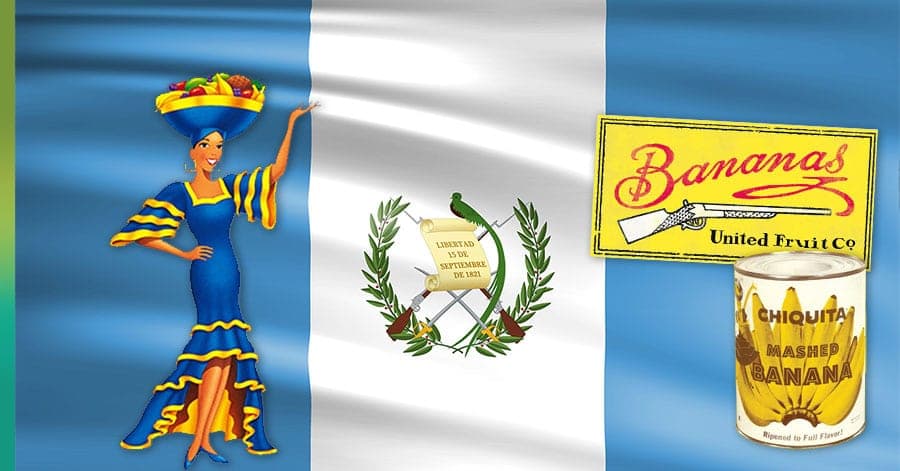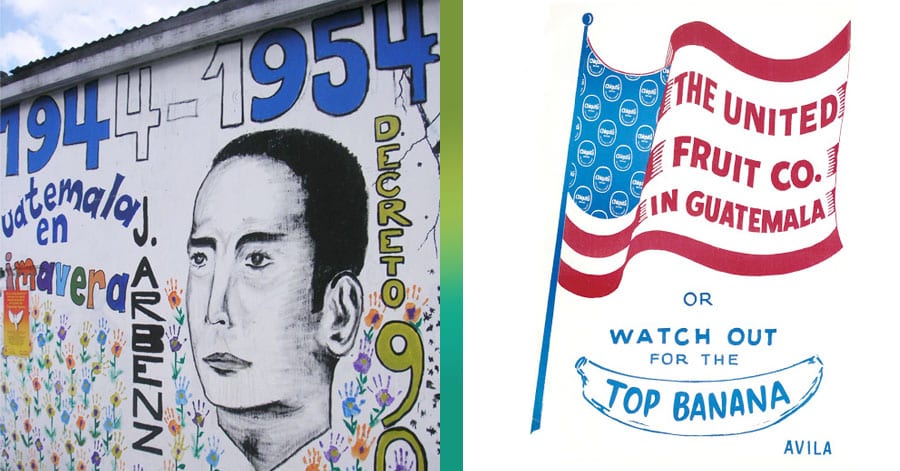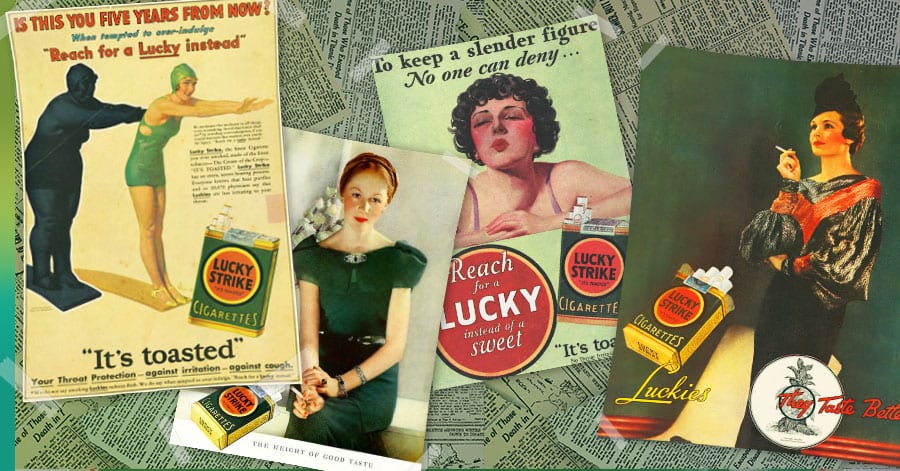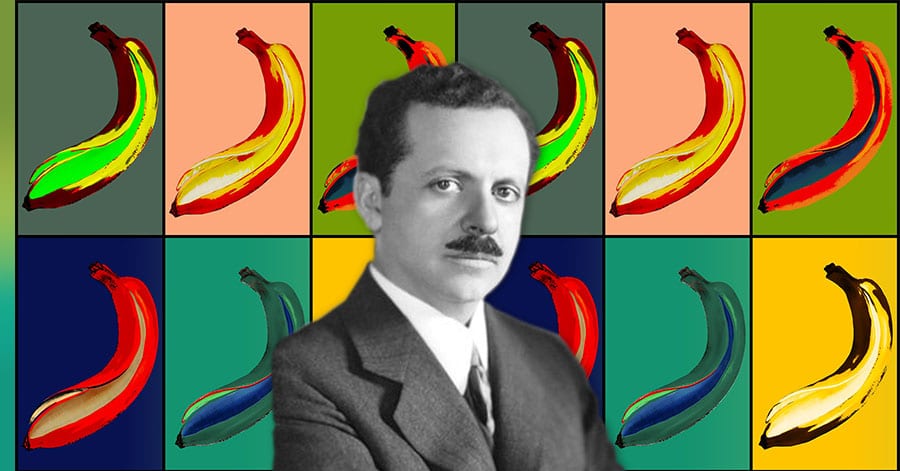Eighty-some years ago a genius of public relations – an evil genius some might say – used brilliant schemes to influence consumer sentiment like no one before him and no one since. His name was Edward Bernays. He was the original out-of-the-box thinker, the first spin doctor, and his clients ranged from cigarette companies to world leaders.
Bernays’ techniques were unusual for the early 20th Century but they’re reflected today in the form of social influencers, celebrity endorsements, product placements, subliminal seduction, and Russian web brigades — you know, those mysterious purveyors of disinformation on the Internet allegedly working for the Kremlin.
Bernays’ instincts and insights into social psychology might very well have been passed down from some of his family members, especially his uncle, the famed psychoanalyst Sigmund Freud!

Banana Power
In the 1940s the United Fruit Company was a multinational, land-controlling, money-making colossus. The company’s operations in Central America included vast areas producing foodstuffs for the entire North American continent, most notably in this case, bananas. But political changes taking place in Guatemala began to pose a threat to United Fruit’s interests when the newly elected President Jacobo Arbenz considered expropriating the company’s lands, a move that would give back land to disenfranchised peasants. Edward Bernays was brought in to figure out ways to protect the fruit company’s interests. A strong advertising campaign was never going to provide a full solution, but it would fuel demand for bananas in the U.S. and prosperous trade with Guatemala would be a needed catalyst to the change United Fruit desired. So, Bernays recruited famous celebrities to hold bananas as they were candidly photographed for millions of newspaper and magazine readers to see. This drove enormous demand for the fruit, as did a catchy song that was soon on the lips of everyone in America. A ditty which hinted of just how large the stakes were with regard to U.S. economic and political interests south of the border.
Edward Bernays’ promotional stunts were only a smokescreen for a not-so-innocent deep-state strategy. With sly public relations tactics, he began to influence American media toward discrediting the new Guatemalan President and ultimately incite action against the duly-elected leader. In 1954, a CIA-backed coup d’état turned the government of Guatemala over to what was ostensibly a leader hand-picked by the U.S. government and indirectly by a U.S. corporation — the United Fruit Company.

“I’m Chiquita Banana and I’ve come to say
I come from little island down Equator way
I sail on big banana boat from Carribee
To see if I can help Good Neighbor policy”
The Terry Twins – 1944
Cleverly inserted into the lyrics of Chiquita Bananas: The Banana Song was a reference to a new U.S. policy. Franklin D. Roosevelt’s “Good Neighbor Policy” encouraged reciprocal exchanges with Latin American countries.
Edward Bernays pulled off a number of other epic campaigns to covertly garner public acceptance and mass appeal for products.
Light Up, Ladies
“Torches of freedom.” It’s a phrase that makes you think of pride, courage, protest, and independence. More literally, it provokes images of a scepter alight with smoke and fire, held high in a grand gesture of triumph, like Lady Liberty. In 1929, this powerful phrase was put to use by Bernays as a metaphor for cigarettes! He launched his “Torches of Freedom” campaign by sending wholesome-looking young women onto New York’s crowded sidewalks during the big Easter Parade. There they confidently puffed cigarettes while mixing with the rest of the onlookers. The femme fatales were photographed enjoying the fanfare and, as designed, the images ended up in scores of newspaper features covering the parade.
Tobacco companies could never get away with such shenanigans today but in 1929, before cigarettes were linked to severe health problems and just before it was widely acceptable for women to smoke, “torches of freedom” put a spin on cigarettes that sent their sales soaring.
“When I’m watchin’ my TV and a man comes on and tells me
How white my shirts can be
But, he can’t be a man ’cause he doesn’t smoke
The same cigarettes as me”
The Rolling Stones – 1965
In their song “I Can’t Get No Satisfaction,” The Rolling Stones reminded us how media and advertising influence how we look at ourselves and how we judge others. Edward Bernays understood this fact long before it became obvious to others.

Be Seen in Green
Now that cigarettes had been made wildly popular among women, researchers at Lucky Strike began to sense they had a problem. The brand’s red and green packaging seemed to be turning away women because the colors clashed with prevailing fashions of the day. Bernays initially suggested changing the brand’s color scheme – practical but not plausible, since the tobacco company opposed that idea because it had invested so much in the packaging. The logo and color scheme had established strong brand recognition for Lucky Strike. So instead, Bernays set off to popularize one of the brand colors with fashion designers. He staged a truly trend-setting event at the ritzy Waldorf Astoria billed as “The Green Ball.” Few involved in the affair were aware of its ulterior motive and the grand event was covered by all the newspapers and magazines. It didn’t take long before green skirts and blouses began showing up on fashion runways and on department store racks. Subsequently, ladies’ wardrobes now matched well with their packs of Lucky Strike!
“This is Ground Control to Major Tom
You’ve really made the grade
And the papers want to know whose shirts you wear”
David Bowie – Space Oddity, 1969
When heroes and trendsetters show us that they like something, whether it be a product, an idea, or a belief, we too often buy into it ourselves. Quality, integrity, and truth don’t matter as much as how we think others will perceive us and if we will be “accepted.”
Contractors Do It Their Way
Luckily, roofing contractors don’t have to resort to covert operations to market their services. Besides, unless you have an Austrian psychoanalyst in your family, as Bernays did, propaganda is probably not in your blood.
Roofing Contractors are skilled, hard working folks who deliver a service that property owners truly need. As a roofing pro, your value proposition is pretty straight-forward. You’ll fix or replace a roof using quality products. You’ll earnestly strive to get the job done right, on time, and at a fair price.
Unlike Edward Bernays, your marketing more or less sticks with tradition… no mind games!
















